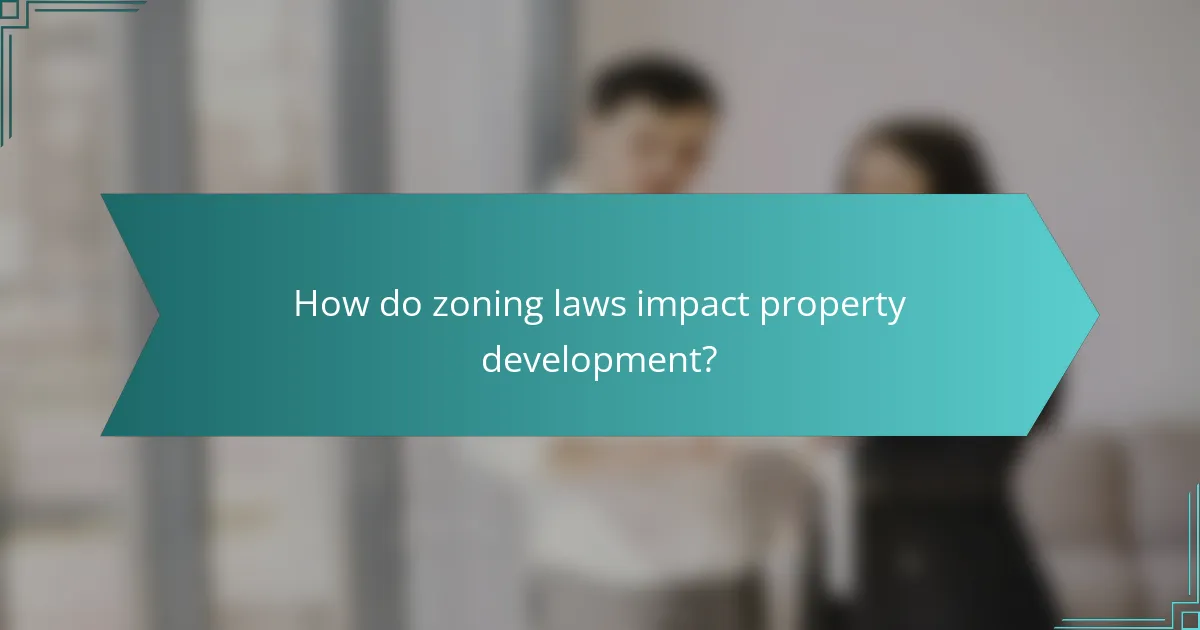Zoning laws play a crucial role in shaping land use and development within communities, ensuring that areas are utilized in ways that benefit the public. By regulating what can be built and where, these laws influence everything from residential housing to commercial projects, impacting property development feasibility and design. They impose restrictions on land use, building dimensions, and overall property development to promote orderly growth and protect community character.

What are the zoning laws in the UK?
Zoning laws in the UK regulate land use and development to ensure that areas are used in ways that are beneficial to the community. These laws dictate what can be built where, influencing everything from residential housing to commercial enterprises.
Local Authority Planning Regulations
Local authority planning regulations are specific to each council and dictate how land can be used within their jurisdiction. These regulations include local plans that outline development goals and policies, which must be adhered to by property developers and homeowners alike.
When considering a development project, it is essential to consult the local planning authority to understand any restrictions or requirements that may apply. This can include design guidelines, environmental assessments, and community consultations.
National Planning Policy Framework
The National Planning Policy Framework (NPPF) provides overarching guidelines for planning in England, emphasizing sustainable development and the need for local plans to align with national priorities. It aims to balance economic growth with environmental protection and social equity.
Developers must ensure their projects comply with the NPPF, which may involve demonstrating how their plans contribute to local housing needs or enhance community facilities. Regular updates to the NPPF can affect ongoing and future projects, making it crucial for stakeholders to stay informed.
Types of Zoning Categories
Zoning categories in the UK typically include residential, commercial, industrial, and agricultural designations. Each category has specific rules regarding the types of activities permitted, which can greatly influence property values and development potential.
For example, residential zones may restrict the construction of commercial buildings, while industrial zones might allow for factories and warehouses. Understanding these categories helps property owners and developers navigate the planning process effectively and avoid potential legal issues.

How do zoning laws impact property development?
Zoning laws significantly influence property development by dictating how land can be used, which in turn affects project feasibility and design. These regulations determine the types of buildings allowed, their density, and the overall character of a community.
Restrictions on Land Use
Zoning laws impose specific restrictions on land use, categorizing areas for residential, commercial, industrial, or agricultural purposes. For instance, a residential zone may prohibit commercial activities, ensuring that neighborhoods remain quiet and family-friendly. Developers must thoroughly review zoning classifications to avoid costly violations.
Different zones may also have restrictions on building height, lot size, and the types of structures permitted. Understanding these limitations is crucial for developers to align their projects with local regulations and community standards.
Impact on Property Values
Zoning laws can significantly affect property values by influencing the desirability of an area. Properties in zones with favorable regulations, such as mixed-use developments, often see higher demand and appreciation compared to those in strictly residential or industrial zones. For example, a neighborhood that allows for commercial development may attract more buyers and investors.
Conversely, overly restrictive zoning can suppress property values by limiting potential uses and developments. Developers should consider how zoning impacts market trends and property desirability when planning their projects.
Compliance Costs for Developers
Compliance with zoning laws can incur substantial costs for developers, including fees for permits, legal consultations, and potential redesigns to meet regulations. These costs can vary widely depending on the complexity of the project and the local zoning requirements. For instance, navigating a lengthy approval process in a densely populated area may require significant financial resources.
To mitigate these costs, developers should engage with local planning authorities early in the process to understand requirements and streamline approvals. Being proactive can help avoid delays and unexpected expenses, ultimately leading to more successful project outcomes.

What are the common restrictions in zoning laws?
Zoning laws typically impose restrictions that govern land use, building dimensions, and the overall development of properties. These regulations are designed to promote orderly growth, protect property values, and ensure compatibility between different land uses.
Height and Bulk Limitations
Height and bulk limitations dictate how tall buildings can be and how much space they can occupy on a lot. These restrictions often vary by zoning district, with residential areas generally having lower height limits compared to commercial zones. For example, a residential building might be capped at two stories, while a commercial property could allow for five or more stories.
When planning a new construction, it’s crucial to check local regulations to avoid costly modifications later. Exceeding height limits can lead to fines or the need to alter or demolish non-compliant structures.
Setback Requirements
Setback requirements specify the minimum distance a building must be from property lines, streets, or other structures. These rules ensure adequate space for light, air, and privacy between properties. For instance, a typical residential setback might require buildings to be at least 10 feet from the front property line.
Understanding these requirements is essential for property owners and developers. Failing to adhere to setback rules can result in legal challenges or the need to redesign a project, which can be both time-consuming and expensive.
Land Use Designations
Land use designations categorize areas for specific types of development, such as residential, commercial, industrial, or agricultural. Each designation comes with its own set of permitted and prohibited uses, which can significantly impact property value and development potential. For example, a property zoned for residential use typically cannot be converted into a commercial space without a zoning change.
Before purchasing or developing land, it’s vital to confirm its zoning designation and understand the implications. Engaging with local zoning boards or planning departments can provide clarity on what is permissible and help avoid future disputes or compliance issues.

How to navigate zoning laws for a new project?
Navigating zoning laws for a new project involves understanding local regulations and obtaining necessary approvals. Key steps include consulting local authorities, conducting thorough research, and possibly engaging with planning consultants to ensure compliance and avoid delays.
Consulting Local Planning Authorities
Engaging with local planning authorities is essential for understanding the specific zoning regulations that apply to your project. These authorities can provide information on zoning classifications, permitted uses, and any restrictions that may affect your plans.
Schedule meetings or consultations to discuss your project and seek guidance on the application process. Be prepared to present your project details and ask about any potential hurdles you may face.
Conducting Zoning Research
Conducting zoning research involves reviewing local zoning codes, maps, and comprehensive plans. This research helps identify the zoning designation of your property and any applicable regulations, such as setback requirements or height restrictions.
Utilize online resources or visit local government offices to access zoning information. Pay attention to any recent amendments to zoning laws, as these can impact your project significantly.
Engaging with Planning Consultants
Hiring a planning consultant can streamline the process of navigating zoning laws. These professionals possess expertise in local regulations and can help you prepare the necessary documentation for zoning applications.
When selecting a consultant, look for someone with a strong track record in your area and relevant experience with similar projects. They can provide valuable insights and help you avoid common pitfalls, ensuring a smoother approval process.

What are the consequences of violating zoning laws?
Violating zoning laws can lead to significant legal and financial repercussions. These consequences may include fines, orders to halt certain activities, and the potential for legal disputes.
Fines and Penalties
Municipalities often impose fines for zoning violations, which can range from a few hundred to several thousand dollars, depending on the severity and frequency of the infraction. Repeat offenders may face escalating penalties, making it crucial to address any zoning issues promptly.
In some cases, fines can accumulate daily until the violation is resolved, leading to substantial financial burdens. Understanding local zoning regulations can help property owners avoid these costly penalties.
Cease and Desist Orders
A cease and desist order is a legal directive requiring individuals or businesses to stop activities that violate zoning laws. This order can be issued by local authorities and may require immediate compliance, halting any ongoing projects or operations.
Failure to comply with a cease and desist order can result in further legal action, including additional fines or even court proceedings. It is essential to respond to such orders swiftly to mitigate further consequences.
Legal Challenges and Appeals
Property owners may contest zoning violations through legal challenges or appeals, which can be a lengthy and costly process. Engaging a lawyer familiar with local zoning laws can provide guidance on the best course of action and improve the chances of a favorable outcome.
During this process, property owners may need to present evidence and arguments to support their case, which can include demonstrating compliance or seeking variances. Understanding the local legal framework is critical for navigating these challenges effectively.

What are the emerging trends in zoning laws?
Emerging trends in zoning laws reflect a shift towards accommodating diverse land uses and promoting sustainable development. These changes often aim to enhance community engagement, support economic growth, and address housing shortages.
Increased Flexibility for Mixed-Use Developments
Increased flexibility for mixed-use developments allows for residential, commercial, and recreational spaces to coexist within a single area. This approach can lead to vibrant communities where people can live, work, and play without extensive commuting.
Local governments are increasingly adopting zoning regulations that permit mixed-use projects, often reducing the need for separate zoning classifications. This flexibility can encourage innovative designs and attract investment, but it requires careful planning to ensure that the needs of all stakeholders are met.
When considering mixed-use developments, developers should assess local zoning ordinances, community needs, and potential impacts on traffic and infrastructure. Engaging with local residents early in the planning process can help identify concerns and foster support for the project.










